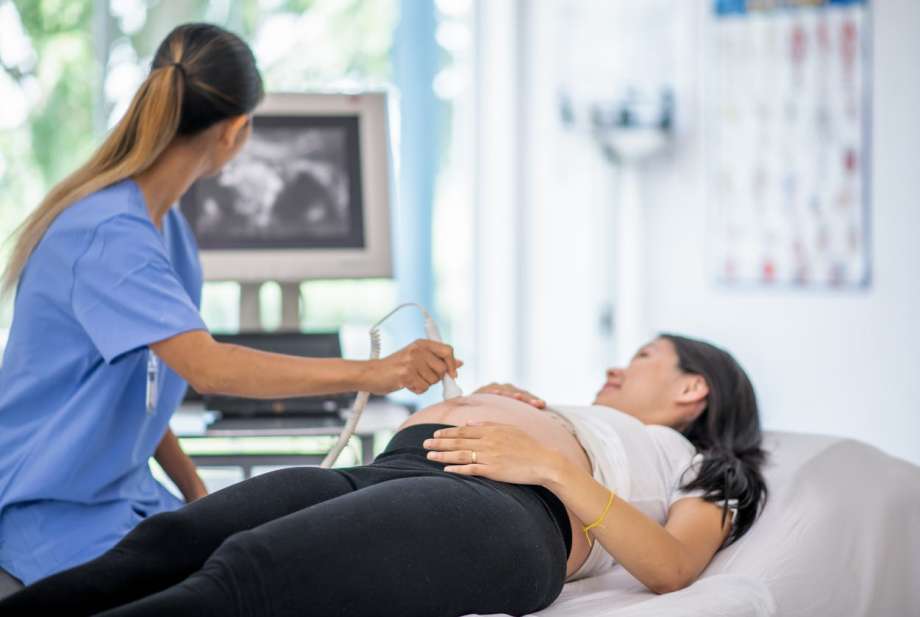What Happens During a First Trimester Ultrasound Exam?

It is standard to have an ultrasound scan during your second trimester, between 18-22 weeks gestation. However, there may be a need for an ultrasound exam to be performed during your first trimester of pregnancy, or for some providers, a first-trimester ultrasound is performed routinely.
If you’re in your first trimester of pregnancy and nervous for your first ultrasound exam, here’s what you can expect.
Related: Understanding Screening Tests During Pregnancy
Purposes of a First Trimester Ultrasound
First-trimester ultrasounds are performed when the gestational age, or estimated due date needs to be confirmed, or when a general assessment of the pregnancy is desired or indicated. If you take a pregnancy test and the result is positive, it’s important to always check in immediately with your healthcare provider to have the pregnancy confirmed.
Determining Your Baby’s Gestational Age
It is very important that the estimated gestational age (how many weeks and days you are into the pregnancy) is as accurate as possible.
The gestational age is used throughout the pregnancy to assess the pregnant woman for appropriate growth of her newborn and to guide the timing of routine, follow-up screenings, and additional screenings (if desired) such as genetic screenings.
Tracking Your Estimated Due Date
If you have regular menstrual periods or know the date you conceived (or the date that a pregnancy was detected after receiving IVF treatment), an early ultrasound might not be necessary to determine the gestational age.
However, if there is uncertainty about when you became pregnant, the date of your last period, or if you became pregnant just after stopping contraception, an ultrasound scan will be used to determine the gestational age and estimate your due date.
Related: Calculating Your Due Date
How Does an Ultrasound Determine the Estimated Gestational Age?
The early ultrasound will measure the length of the fetus, from its head to its bottom. This is known as the crown-rump length. The accuracy of estimating the gestational age is much better in early pregnancy than later in pregnancy.
For example, determining the estimated due date with an ultrasound in the first trimester is expected to be within five to seven days of your actual due date. If dating by ultrasound isn’t performed until the third trimester, the estimated date could be more than 14 days (or two weeks) from your actual gestational age.
So, if you are unsure of when you became pregnant, it is best to have an ultrasound scan as early as possible, ideally between 10 and 14 weeks.

Will my estimated due date change after my first-trimester ultrasound?
As long as the first-trimester ultrasound has an estimated due date within five to seven days of your predicted due date, you will keep your original due date.
For example, if your last menstrual period gives an estimated due date of May 8th, and the early ultrasound predicts a due date of May 10th, you will keep your original EDD of May 8th.
However, if you were unsure of the date of conception or when your last menstrual period occurred, and the estimated date based on the ultrasound scan differs by more than five to seven days, the accuracy of the ultrasound scan’s prediction may be better than the estimated guess. If this is the case, the gestational age may be changed.
What Does the First-Trimester Ultrasound Show?
While some may experience normal implantation bleeding, if there is a concern regarding bleeding or unexpected pain, an ultrasound scan may be recommended. The scan will be able to assess the fetus and determine other causes of bleeding, such as a threatened miscarriage or an ectopic pregnancy, which requires immediate treatment.
Even though it is early in the pregnancy, an initial first ultrasound is able to provide very useful information through sonographic imaging. The scan can:
- Confirm that the baby has been implanted in the uterus (rather than in the fallopian tube, as is the case with ectopic pregnancy)
- Detect the presence and location of the fetus
- Detect the presence of a heartbeat, and determine the heart rate (after six weeks)
- Determine the size of the fetus (which can then be used to determine or confirm the estimated due date)
- Detect the presence of multiple pregnancies (twins or triplets)
- Screen for potential risks of genetic anomalies or abnormalities. However, this will not diagnose or confirm birth defects.
What Type of Ultrasound Scan Will I Have?
There are different types of ultrasound scans, including doppler ultrasounds, transabdominal ultrasounds, and transvaginal ultrasounds.
During the first trimester of pregnancy, the baby is usually no bigger than the size of an olive (1.5 inches) and is protected by the pubic bone. Because of this, prenatal ultrasounds are performed transvaginally, rather than abdominally, until the second trimester.
How an Ultrasound Is Performed

- Before the transvaginal ultrasound, you will be asked if you have a full bladder, and will then be asked to empty it. This will improve your comfort and can also help improve the image of the ultrasound.
- You might be asked to change into a gown and you will then recline on an exam table, with your feet in stirrups. A lubricated wand will be placed into the vagina in order to view the uterus and baby. If you have any history of trauma, you can request inserting the vaginal probe yourself.
- There may need to be minor movements or adjustments of the wand in order to get a clearer picture, but there should not be any pain involved in the procedure.
- The ultrasound technician or sonographer will capture a few photos and obtain the information needed. They may provide a printed sonogram for you to take home.
Risks and Safety of Ultrasound Scans in Pregnancy
An ultrasound scan uses sound waves. As the sound waves come into contact with tissues and fluids, the information from that sound wave creates an image or sonogram.
Ultrasounds have not been associated with harm to the developing fetus. However, it is recommended that you only have ultrasound scans when arranged by your healthcare provider.
—
For more information on what to expect when getting an ultrasound, see these real-life ultrasound images!

